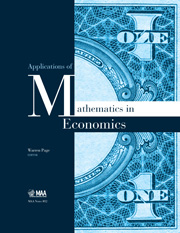Book contents
- Frontmatter
- Contents
- Preface
- Notes on the Sections
- Problems and Subject Areas
- 1 Microeconomics
- 2 Scenarios Involving Marginal Analysis
- 3 Intermediate Macroeconomics Theory
- 4 Closed Linear Systems
- 5 Mathematics in Behavioral Economics
- 6 Econometrics
- 7 The Portfolio Problem
- 8 Topics in Modern Finance
- 9 Maximizing Profit with Production Constraints
- About the Editor
- About the Authors
3 - Intermediate Macroeconomics Theory
- Frontmatter
- Contents
- Preface
- Notes on the Sections
- Problems and Subject Areas
- 1 Microeconomics
- 2 Scenarios Involving Marginal Analysis
- 3 Intermediate Macroeconomics Theory
- 4 Closed Linear Systems
- 5 Mathematics in Behavioral Economics
- 6 Econometrics
- 7 The Portfolio Problem
- 8 Topics in Modern Finance
- 9 Maximizing Profit with Production Constraints
- About the Editor
- About the Authors
Summary
Introduction
The organizational chart for course work leading to an undergraduate major in economics has the shape of an inverted pyramid. All students begin by completing a one- or two-semester principles of economics course. Majors next complete three intermediate theory courses including intermediate microeconomics, intermediate macroeconomics, and statistics for economics. In many universities, all three intermediate theory courses are prerequisites for field courses so that students master a common set of tools, vocabulary, and problem solving techniques before specializing.
There is a good bit of variety in the course content of the intermediate macroeconomics theory (IMAC) course. The mainstream course teaches four broadly defined topics. The first topic concerns the construction and interpretation of data that describe the state of the economy. These data include current and constant dollar measures of total output, consumption, investment, government spending, exports and imports. They include measures of labor market outcomes such as employment, the unemployment rate, and the labor force. They also include measures of conditions in financial markets, notably interest rates and money stock measures. And they include price indices such as the consumer price index, the producer price index, and the GDP deflator. IMAC students learn how to collect these data and use them to make and support inferences about the state of the economy. They use mathematics to extract trends from the data, compute growth rates, and combine the data in valid and interesting ways.
- Type
- Chapter
- Information
- Applications of Mathematics in Economics , pp. 27 - 44Publisher: Mathematical Association of AmericaPrint publication year: 2013



